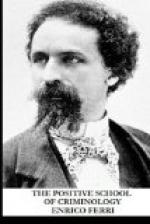We may say that in social life penalties have the same relation to crime that medicine has to disease. After a disease has developed in an organism, we have recourse to a physician. But he cannot do anything else but to reach the effects in some single individual. On the other hand, if the individual and the collectivity had obeyed the rules of preventive hygiene, the disease would have been avoided 90 times in 100, and would have appeared only in extreme and exceptional cases, where a wound or an organic condition break through the laws of health. Lack of providence on the part of man, which is due to insufficient expression of the forces of the intellect and pervades so large a part of human life, is certainly to blame for the fact that mankind chooses to use belated remedies rather than to observe the laws of health, which demand a greater methodical control of one’s actions and more foresight, because the remedy must be applied before the disease becomes apparent. I say occasionally that human society acts in the matter of criminality with the same lack of forethought that most people do in the matter of tooth-ache. How many individuals do not suffer from tooth-ache, especially in the great cities? And yet any one convinced of the miraculous power of hygiene could easily clean his teeth every day and prevent the microbes of tooth rot from thriving, thereby saving his teeth from harm and pain. But it is tedious to do this every day. It implies a control of one’s self. It cannot be done without the scientific conviction that induces men to acquire this habit. Most people say: “Oh well, if that tooth rots, I’ll bear the pain.” But when the night comes in which they cannot sleep for toothache, they will swear at themselves for not having taken precautions and will run to the dentist, who in most cases cannot help them any more.
The legislator should apply the rules of social hygiene in order to reach the roots of criminality. But this would require that he should bring his mind and will to bear daily on a legislative reform of individual and social life, in the field of economics and morals as well as in that of administration, politics, and intelligence. Instead of that, the legislators permit the microbes of criminality to develop their pathogenic powers in society. When crimes become manifest, the legislator knows no other remedy but imprisonment in order to punish an evil which he should have prevented. Unfortunately this scientific conviction is not yet rooted and potent in the minds of the legislators of most of the civilized countries,




